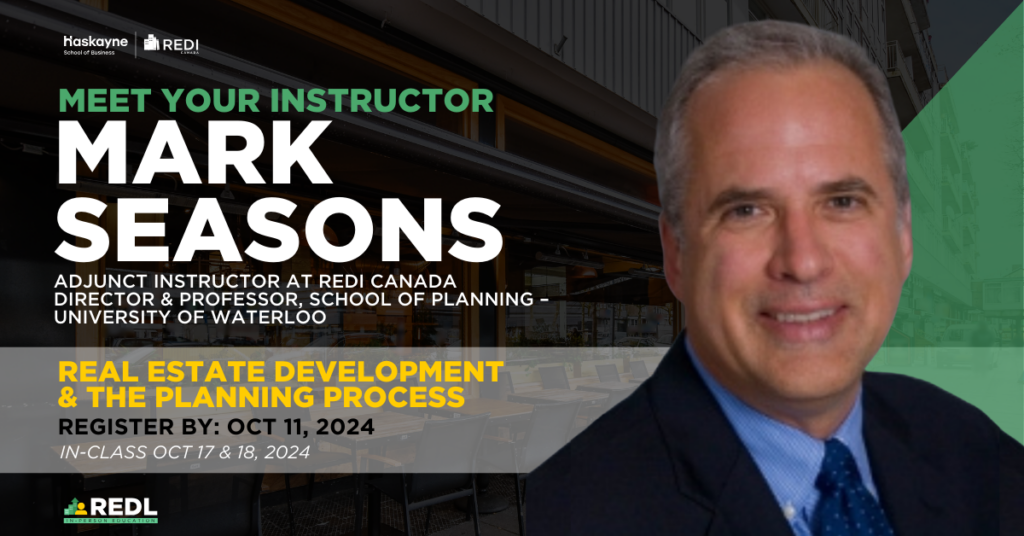
Planning: Meet Your Instructor, Mark Seasons
Updated September 4, 2024
This series introduces you to REDI’s adjunct instructors who teach Real Estate Development Leadership (REDL) courses offered in collaboration with the Haskayne School of Business.
Mark Seasons instructs HSK 824: Real Estate Development & the Planning Process through the immersive, two-day Real Estate Development Leadership certificate on October 17 & 18, 2024, in Calgary, Alberta.

Tell us about yourself.
I am a Professor at and the Director of the School of Planning at the University of Waterloo, which I joined in 1998 following almost 20 years in planning practice. I’m a Fellow, Canadian Institute of Planners and a Registered Professional Planner (Ontario), with my education background including: a BA (Honours Geography – Queen’s), MEnvDes (Planning – Calgary), and PhD (Regional Planning – Waterloo).
I’ve practiced as an urban planner with the City of Calgary, the New Zealand federal government, the Province of Ontario, and the Canadian federal government’s National Capital Commission. My work has spanned the areas of urban renewal, long-range planning, neighbourhood revitalization, regional planning, and non-profit housing. My research interests include plan evaluation, planning for climate change, strategic planning, and planning for slow-growth or declining cities. I was also editor-in-chief of Plan Canada, the Canadian Institute of Planning’s practice-oriented journal, from 2005-10. In 2021, I published a sole-authored and peer-reviewed text on plan monitoring and evaluation (Evaluating Urban and Regional Plans: From Theory to Practice, UBC Press).
What can participants expect from their course with you?
My objective is to introduce my real estate development professional colleagues to the planning system. I want course participants to leave the course with an enhanced and more complete understanding of why things happen as they seem to in the planning world. I want to reduce confusion and misunderstandings about what happens and why in planning. This way, real estate development professionals will be in a better position to explain the broader context for clients and investors, and to make better-informed decisions about projects.
How is this course material relevant to real estate development professionals?
I think this course will not only explain how planners and the planning system operate, but why. The course explains the reasons for what might seem rather opaque rules and regulations. Real estate development professionals need to understand the broader context within which planning decisions are made, the factors that planners have to consider, and the roles and powers of planning policies and tools (e.g., zoning). They, and their clients and investors, need the best possible, fully-informed advice. With that knowledge, decision-makers will understand what’s possible (or prohibited) for their property or project and that is very valuable information. I also feel that planners would benefit from real estate development colleagues’ experiences with on-the-ground impacts of plans and policies like what is working (or not), and what should be done about it.
What misconceptions do people have about planning offices and/or the planning profession?
No question, there are lots of opinions about planners and some of them are not too flattering! For example, we hear about how planners and their processes get in the way and how they obstruct rather than facilitate. The thing to remember is that planners work within prescribed legal frameworks, so they must comply with the laws and policies of the day.
Planners also work in multi-stakeholder, decision-making environments with multiple “publics” where there are opportunities for meaningful consultation and perspectives. We report to Councils that have their own perspectives and final decision-making authority. We also operate in a world of compromises and trade-offs on most things. Perhaps most importantly, planners also have an obligation to focus on the public good or public interest, rather than individual interests (e.g., developers). So, there’s a real need to educate and orient people to what the planner, and the planning system, can and cannot achieve in this rather complex environment.
What’s a piece of advice you look forward to discussing with HSK 824 participants?
I think we have a tendency to do what we’re told and taught, about expected roles and ways of seeing the world when on the job. While we might master how things are done at our workplace, we often lose sight of the “big picture”. We should know what’s happening out there, and what it all might mean for how we do our jobs. So, I would say it’s about acquiring the courage and confidence to challenge (in a constructive, positive manner) the conventional, accepted wisdom. I think that comes with maturity and experience.
Why are you passionate about delivering this course?
I see this course, and the REDI Canada model generally, as an opportunity for me to help build capacity for non-planners who need to know how to navigate the planning system. It’s also a great opportunity for mutual learning. Through conversations with my real estate development colleagues, I can learn about their world, and then reflect on what it all means for planning.
Interested in starting your journey with REDI Canada?
Registration for in-person REDL courses, offered through the University of Calgary’s Haskayne School of Business, is open now. Check out upcoming courses through the Executive Education website. Or, visit redicanada.org to find the right program and courses for your career goals.